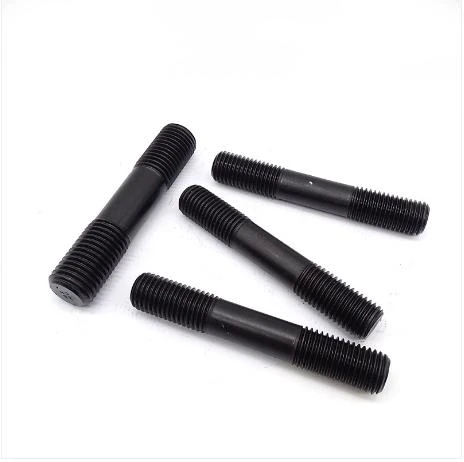

Alternative Specifications for DIN 125 Washers and Their Applications in Various Industries
Nov . 10, 2024 18:35 Back to list
Alternative Specifications for DIN 125 Washers and Their Applications in Various Industries
Understanding DIN 125 Washers Essential Components for Mechanical Integrity
In the world of mechanical engineering and assembly, the importance of washers cannot be overstated. Among the various types of washers, DIN 125 washers, standardized by the Deutsches Institut für Normung (DIN) or the German Institute for Standardization, are widely recognized and utilized across numerous industries. This article delves into the key features, applications, and benefits of DIN 125 washers, providing a comprehensive overview of their role in ensuring mechanical integrity.
What is a DIN 125 Washer?
A DIN 125 washer is a flat washer made from various materials, including steel, stainless steel, plastic, and more. Its primary function is to distribute load over a larger surface area, which helps prevent damage to the components and surfaces being joined. This type of washer is characterized by its simple circular shape and comes in different diameters and thicknesses, according to specific applications and requirements.
The DIN 125 standard defines the dimensions and specifications for these washers, ensuring consistency in quality and performance. The implementation of standardized washers promotes interchangeability and compatibility within various mechanical systems, which is crucial for reducing downtime and enhancing maintenance efficiency.
Applications of DIN 125 Washers
DIN 125 washers find applications in a wide range of industries. They are commonly used in construction, automotive, aerospace, and manufacturing sectors. Their versatility allows them to be utilized in numerous assembly processes, ranging from securing bolts and nuts in mechanical systems to providing cushioning and stability in electrical devices.
1. Construction In construction, DIN 125 washers are essential for securing structural elements and ensuring the stability of various installations. They are often used in conjunction with nuts and bolts to secure steel beams, brackets, and other structural components.
2. Automotive In automotive applications, these washers help to maintain the integrity of assembly joints, reducing the risk of wear and tear caused by vibrations. They can be found in engine components, chassis assemblies, and more.
3. Aerospace The aerospace industry requires precise specifications and high-quality materials due to the extreme conditions aircraft face. DIN 125 washers are used in various aircraft components where reliability is critical.
din 125 washer

4. Manufacturing In general manufacturing, these washers are crucial for assembling machinery and equipment, contributing to the overall safety and functionality of products.
Benefits of Using DIN 125 Washers
The incorporation of DIN 125 washers into mechanical assemblies offers several key benefits
1. Load Distribution By spreading the load across a larger area, these washers help prevent damage to softer materials and minimize the risk of deformation in joints.
2. Vibration Damping These washers provide a buffer, absorbing shock and vibrations. This characteristic is particularly important in applications where machinery operates under high stress or oscillation.
3. Corrosion Resistance Depending on the material, DIN 125 washers can offer significant resistance to corrosion. Stainless steel washers, for example, are ideal for applications exposed to moisture and harsh environments.
4. Cost-Effectiveness By ensuring that assemblies operate more efficiently and reducing wear, DIN 125 washers can contribute to lower maintenance costs and longer service life for components.
5. Standardization As these washers conform to established DIN standards, they enable easy sourcing and replacement, fostering efficiency in production and maintenance processes.
Conclusion
In conclusion, DIN 125 washers are fundamental components in a variety of mechanical applications. Their ability to distribute load, dampen vibrations, and enhance the durability of assemblies makes them indispensable in many industries. With a focus on quality and standardization, DIN 125 washers play a crucial role in maintaining the integrity of machines and structures, ultimately contributing to safety and performance in engineering projects. Whether in construction, automotive, aerospace, or manufacturing, understanding the value and function of DIN 125 washers is essential for engineers and technicians alike.
Latest news
-
High-Strength Hot Dip Galvanized Bolts - Hebei Longze | Corrosion Resistance, Customization
NewsJul.30,2025
-
Hot Dip Galvanized Bolts-Hebei Longze|Corrosion Resistance&High Strength
NewsJul.30,2025
-
High-Strength Hot-Dip Galvanized Bolts-Hebei Longze|Corrosion Resistance&High Strength
NewsJul.30,2025
-
Hot Dip Galvanized Bolts-Hebei Longze|Corrosion Resistance&High Strength
NewsJul.30,2025
-
Hot Dip Galvanized Bolts - Hebei Longze | Corrosion Resistance, High Strength
NewsJul.30,2025
-
High-Strength Hot Dip Galvanized Bolts-Hebei Longze|Corrosion Resistance, Grade 8.8
NewsJul.30,2025

